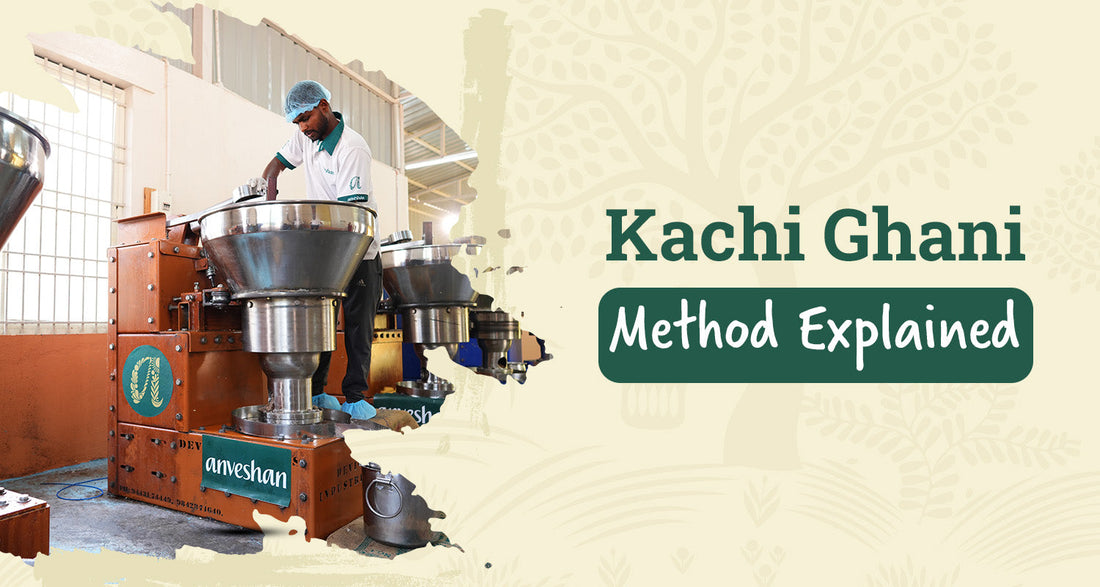
Kachi Ghani Method Decoded: What is it? How is it Different from Cold-Pressed?
Share
The phrase kachi ghani means oil extracted through a slow wooden or stone press, without chemicals or high heat. “Kachi” means raw or cold, and “Ghani” refers to the mill. This method has been trusted in Indian households for centuries because it produces pure, unrefined edible oils that keep their authentic taste and aroma.
What Is Cold-Pressed Oil?
Cold-pressed oil is a category of extraction in which the temperatures are maintained low. Here’s the catch: there is no official standard or limit for cold-pressing. As temperatures go as high as 320°C, anybody who extracts their oil under that temperature, calls themselves cold-pressed. So as a result, producers who extract oils through expeller & rotary methods, where the temperatures go as high as 140°C-150°C even call themselves cold-pressed. But, the natural properties of the oilseeds, their flavour, their aroma, their natural vitamins and antioxidants, all die at 60°C-70°C. So, only brands that press seeds under this temperature are truly cold-pressed. This process helps retain antioxidants, enzymes, and vitamins that are usually destroyed in refined oils. At Anveshan, we combine traditional methods and modern science and process our high-grade, native oilseeds in stainless steel, low RPM kolhus. This way, we ensure that the temperature never crosses 40°C.
Here we have brought the best of tradition (kachi khani) with modern science and hygiene. This is the Anveshan way real cold-pressed oils, extracted in a way that keeps all natural properties alive.
At Anveshan, we offer cold-pressed mustard oil, sesame oil, groundnut oil, and coconut oil.
Kachi Ghani is one of the oldest methods to extract oil in India, which was one of the cold-pressing methods.
Cold-Pressed vs Refined Oils
One of the biggest differences in cooking oils is between cold-pressed and refined. Refined oils are processed using high heat, chemical solvents like hexane, and deodorizing agents, while cold-pressed oils are extracted naturally.
|
Feature |
Cold-Pressed / Kachi Ghani |
Refined Oils |
|
Extraction |
Wooden/stone/steel ghani, low temperature (<40°C at Anveshan) |
Industrial refining with heat & chemicals |
|
Nutrients |
Retains vitamins, antioxidants |
Nutrients lost during refining |
|
Flavor |
Raw, authentic taste |
Neutral, bland |
|
Chemicals |
No solvents or preservatives |
Uses chemicals and additives |
|
Shelf Life |
6–9 months naturally |
Longer with stabilizers |
This shows why many health-conscious families now prefer natural oil vs refined oil for daily use.
Difference Between Cold-Pressed & Refined Oils in Daily Life
The difference becomes clear in the kitchen:
-
Cooking: Cold-pressed oils bring authentic aroma and flavour, while refined oils taste neutral and look pale.
-
Nutrition: Cold-pressed oils are nutrient-rich, while refined oils offer mainly empty calories.
-
Tradition: In India, kachi ghani means a cultural connection to purity, unlike mass-produced refined oils.
Benefits of Cold-Pressed (Kachi Ghani) Oils
Switching to Kachi Ghani oils has multiple health benefits:
-
Rich in vitamin E, A, and antioxidants
-
Contains heart-friendly MUFAs and PUFAs
-
Supports better digestion and metabolism
-
Adds authentic flavor to Indian cooking
-
Completely chemical-free and unrefined
These qualities make them some of the best healthy cooking oils for modern households.
Why Cold-Pressed Oils Are Becoming Popular Again
More consumers are turning back to cold-pressed oils because they want foods that are natural, chemical-free, and nutrient-dense. Modern brands now highlight their farm-to-bottle journey, lab-test reports, and sustainable packaging, which make these oils more trustworthy. Ayurveda has also renewed interest in cold-pressed oils, since they are viewed as both food and medicine.
Cold-Pressed vs Kachi Ghani: Are They the Same?
Cold-pressed is a global term, while kachi ghani means the Indian version of it. Both describe oils extracted without heat or chemicals, but “Kachi Ghani” refers specifically to the wooden ghani method used in India. So, when you buy kachi ghani mustard oil or sesame oil, you are essentially buying a traditional cold-pressed oil.
Identifying Genuine Kachi Ghani Oils
To ensure you’re buying authentic oil:
-
Look for labels that say Kachi Ghani or Wood-Pressed
-
Check for lab test reports that confirm purity
-
Choose brands that are transparent about sourcing
-
Prefer oils stored in glass or food-safe containers
Anveshan’s Role in Preserving Kachi Ghani Tradition
At Anveshan, we ensure that kachi ghani means exactly what it should—purity, authenticity, and nutrition. We bring together the best of both tradition and science. So we recreate the traditional kachi-ghani method using stainless steel, food-grade kolhus with low RPM motors. Clean, safe, and no animal cruelty (the wooden kolhus were traditionally run using bollocks). So, our cold-pressed oils are:
-
Extracted in food-grade kolhus
-
Made using the highest quality native seeds
-
Sourced directly from farmers
-
Tested in labs for quality and safety
-
Packed fresh in sustainable packaging
When you bring home Anveshan oils, you’re choosing both health and heritage.
FAQ on Kachi Ghani Oils
Q1: Kachi Ghani means what in simple words?
It means oil extracted at low temperatures in a wooden or stone press, free from chemicals.
Q2: Is Kachi Ghani oil healthier than refined oil?
Yes, it retains natural nutrients and antioxidants lost in refined oils.
Q3: What oils are made using Kachi Ghani?
Mustard, sesame, groundnut, sunflower, and coconut oils are most common.
Q4: Is cold-pressed oil the same as Kachi Ghani?
Yes, but Kachi Ghani is the traditional Indian cold-pressed method.












 You saved ₹-48 on this order
You saved ₹-48 on this order

